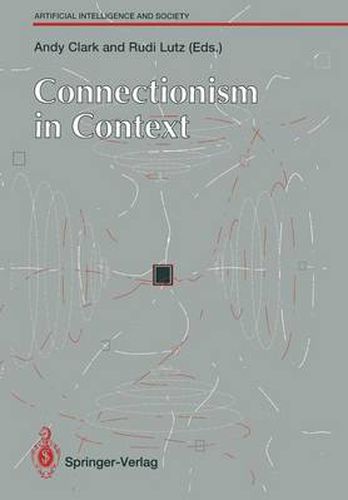Readings Newsletter
Become a Readings Member to make your shopping experience even easier.
Sign in or sign up for free!
You’re not far away from qualifying for FREE standard shipping within Australia
You’ve qualified for FREE standard shipping within Australia
The cart is loading…






This title is printed to order. This book may have been self-published. If so, we cannot guarantee the quality of the content. In the main most books will have gone through the editing process however some may not. We therefore suggest that you be aware of this before ordering this book. If in doubt check either the author or publisher’s details as we are unable to accept any returns unless they are faulty. Please contact us if you have any questions.
Connectionism is a generic term which embraces a large variety of specific algorithmic forms and architectures. What unites the models is a commitment to the use of simple individual processing units, arranged to process information by a form of co-operative parallelism. As such, it is an approach to computation that differs significantly from the more conventional symbol processing methods traditionally associated with artificial intelligence. The field of connectionism is one of the fastest growing and most genuienly interdisciplinary areas in contemporary cognitive scienct. Connectionism in Context aims to broaden and extend the debate concerning the significance fo connectionist models. The volume collects together a variety of perspectives by experimental and developmental psychologists, philosphers and active A1 researchers. These contributions relate connectionist ideas to historical psychological debates, for example, over behaviourism and associationism, to developmental and philosophical issues. The result is a volume which addresses both familiar, but central, topics such as the relation between connectionism and classical A2, and less familiar, but highly challenging topics, such as connectionism, associationsim and behaviourism, the distinction between percpetion and cognition, the role of environmental structure, and the potential value of connectionism as a means of symbol grounding . The nine essays have been written with an interdisciplinary audience in mind and avoid both technical jargon and heavy mathematics.
$9.00 standard shipping within Australia
FREE standard shipping within Australia for orders over $100.00
Express & International shipping calculated at checkout
This title is printed to order. This book may have been self-published. If so, we cannot guarantee the quality of the content. In the main most books will have gone through the editing process however some may not. We therefore suggest that you be aware of this before ordering this book. If in doubt check either the author or publisher’s details as we are unable to accept any returns unless they are faulty. Please contact us if you have any questions.
Connectionism is a generic term which embraces a large variety of specific algorithmic forms and architectures. What unites the models is a commitment to the use of simple individual processing units, arranged to process information by a form of co-operative parallelism. As such, it is an approach to computation that differs significantly from the more conventional symbol processing methods traditionally associated with artificial intelligence. The field of connectionism is one of the fastest growing and most genuienly interdisciplinary areas in contemporary cognitive scienct. Connectionism in Context aims to broaden and extend the debate concerning the significance fo connectionist models. The volume collects together a variety of perspectives by experimental and developmental psychologists, philosphers and active A1 researchers. These contributions relate connectionist ideas to historical psychological debates, for example, over behaviourism and associationism, to developmental and philosophical issues. The result is a volume which addresses both familiar, but central, topics such as the relation between connectionism and classical A2, and less familiar, but highly challenging topics, such as connectionism, associationsim and behaviourism, the distinction between percpetion and cognition, the role of environmental structure, and the potential value of connectionism as a means of symbol grounding . The nine essays have been written with an interdisciplinary audience in mind and avoid both technical jargon and heavy mathematics.